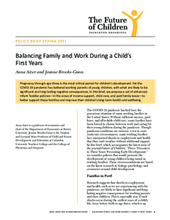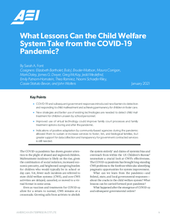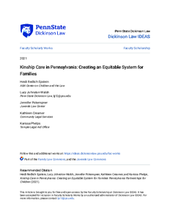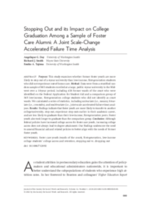Displaying 391 - 400 of 2221
This episode focuses on the current reality of reunification across the public child welfare system. Listeners will hear a conversation among child welfare professionals, members of the American Bar Association (ABA) Center on Children and the Law(opens in new window), the Children’s Bureau, and an alumnus of foster care.
The 32nd edition of the Annie E. Casey Foundation's KIDS COUNT® Data Book describes how children across the United States were faring before — and during — the coronavirus pandemic.
This report summarizes findings from a mixed-methods case study of innovations and challenges within four Bethany foster care locations in the U.S.: Atlanta, Georgia; Philadelphia, Pennsylvania; Detroit, Michigan; and Grand Rapids, Michigan.
The New Neighborhood is a limited series podcast that explores some of the dramatic changes taking place across the U.S. as people work to reinforce a sense of community, support young children and families, and work to build equity within communities.
In this brief, the authors propose a set of enhanced Infant-Toddler policies—in the areas of income support, child care, and paid family leave—to better support families and improve their children’s long-term health and wellbeing.
This paper asks the questions: What can we learn from the pandemic—and federal, state, and local governmental responses— about the cracks in the child welfare system? What lessons can be carried forward post-pandemic?
Families over Facilities is a call to action to end the unnecessary institutionalization of children in child welfare. The report details the physical, mental and emotional harm done to children in group settings, the significant unnecessary taxpayer costs associated with the practice, and violations of children’s civil and human rights.
"While Pennsylvania has made great strides in ensuring family preservation, placement with kin and the maintenance of kinship connections, there is an opportunity to identify strategies to increase these outcomes and become a national leader in putting families first," this report argues. The paper outlines concrete policy solutions that "can improve this trajectory, making Pennsylvania a model for other states [in the U.S.]."
This study examines whether former foster youth are more likely to stop out of a 4-year university than low-income, first-generation students who did not experience out-of-home care.
The objective of this study was twofold: to explicate how a culturally adapted parent training (PT) intervention for diverse families involved in child welfare services (CSW) was perceived by participants and to better understand how interventionists adapted to families’ needs.






